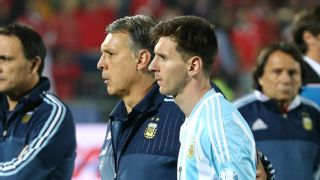|
MEXICO CITY -- News of Gerardo Martino's impending exit from Atlanta United made waves in Mexico this week. The stage is set for the Argentine manager to take Mexico's national team program in December, when his current contract expires. The buzz over Martino's reported (but not confirmed) move to El Tri is growing, and the latest bit of news has fans wondering about what his squad will look like should he take over for interim manager Ricardo "Tuca" Ferretti. However, what will Mexico's calendar look like in 2019? The CONCACAF Gold Cup stands out as the team's most alluring commitment. Though it pales in competitive level compared to, say, the Copa America, the Gold Cup remains a tough assignment -- and a tournament former Mexico manager Miguel Herrera called "harder than qualifying to the World Cup." Speaking of which, the calendar for World Cup qualification has yet to be announced by FIFA, meaning Martino's first year will likely be focused around the Gold Cup and international friendly dates in which he can deftly evaluate the players at his disposal. Having missed out on the 2017 edition's final under Juan Carlos Osorio's assistant, Pompilio Paez, next year's Gold Cup will present a higher amount of pressure for Mexico, who will need to win it in order to qualify for the CONCACAF Cup, the winner-take-all match that will determine CONCACAF's entry for the 2021 Confederations Cup. In 2015, Miguel Herrera called a group led mostly by established players, sprinkling in only two players below the age of 25: Jesus "Tecatito" Corona and Diego Reyes. Despite the experience players like Guillermo Ochoa, Andres Guardado and Oribe Peralta brought to the table, Mexico still struggled, making the Gold Cup final amidst a controversial 2-1 win over Panama in the semifinals. It remains to be seen what Martino's approach will be toward roster building for such an important tournament. Reports that Martino has been offered information about Mexico's youth squads is encouraging, as evidenced by the manager's previous experience with Paraguay and Argentina. For the 2011 Copa America, a tournament in which his team made the final, Martino called seven players aged 25 or less to the Paraguayan squad. Despite the apparent need to refresh Mexico's roster on a generational scale, Martino's well-documented handling of stars is also alluring for his potential new job in dealing with the established stars already on the team. During his run with Argentina, Martino shepherded a talented but troubled squad to two consecutive Copa America finals. In both 2015 and 2016, Martino's strong bond with Sergio Aguero, Angel Di Maria, but mostly Lionel Messi, was highlighted as Argentina lost to Chile in excruciating fashion. Messi's relationship with Martino continues to make headlines, to the point that the manager was accused of taking the playmaker's orders when it came to building lineups and formations. "I never did what Messi said, that was a created myth, said by many people," said Martino at the time. "I don't deny it, the facts do."  The perception of Martino as a player-friendly manager who coaxed the best out of Messi at the national team level will help his credibility when dealing with the group led by Guardado, Ochoa, Javier Hernandez, Carlos Vela and Miguel Layun. All are expected to continue with the Mexican national team at least for the early part of this World Cup cycle. While outgoing manager Juan Carlos Osorio was criticized in part due to player rotations and a perceived strategic inflexibility, it remains to be seen whether Martino's tactical style will capture the hearts and minds of fans. During his tenure at Barcelona, Martino's style was seen as a spiritual successor to Pep Guardiola's high-press style on defense that had waned a bit after the manager left for Bayern Munich. "I go for possession, attacking, putting a lot of men in the opposing half, taking risks," Martino told Barcelona's official website in 2013. However, the team's once gaudy possession stats did fall a bit, with Martino preferring to have Barcelona's midfielders and forwards attack in a more direct fashion, dissuading them from the characteristic tiki-taka style that favored wearing down defenses slowly. With Argentina, Martino continued along those lines, keeping Messi as the focal point of his offense all the while instructing his team's defensive unit to wear down attacks via strong pressing. The strategy, at times, yielded some of La Albiceleste's prettiest soccer in years -- their 6-1 dismantling of Paraguay in the 2015 Copa America semifinal comes to mind -- but ultimately did not help him escape criticism, as the team fell short in the decisive moments. More recently, with Atlanta, Martino has shown tactical flexibility that has seen him range from using a 3-5-2 formation (with one midfielder either pushing forward or pushing back depending on the opponent) to a 4-3-3 in his two seasons in charge of the MLS club. In both formations, Martino's focus on offense is to spread the field, allowing wingbacks and wide midfielders ample freedom to join attackers in the final third of the pitch. The idea is not too dissimilar to a few of Osorio's staple strategies in his time with Mexico, suggesting most players will be able to adapt quickly. Finally, and perhaps most importantly, Martino's evaluation will center on how he deals with the inevitable criticism and questioning lobbed at him from media members. Though publicly, Osorio was beyond patient amid sometimes rude and persistent questions, he was worn down privately over three years, to the point of rejecting Mexico's offer to continue on through the 2022 World Cup process. In Atlanta, Martino has been a little snippier and less willing to deal with questions regarding his future employment with Mexico, and he was famously driven out of the Argentina job by a mix of media pressure and constant turmoil within the Argentine federation, which was in flux following the death of Julio Grondona, the AFA's longtime head. Though Mexico's federation saw an incident-free transition of power following the World Cup, the FMF has never been immune to the type of issues leading to Martino's resignation in his home country. Next year's calendar lacks significant punch outside of the Gold Cup, but 2019 will serve as a significant preview as to what Gerardo Martino is capable of bringing to Mexico as its new full-time manager in front of the next World Cup cycle.
|

